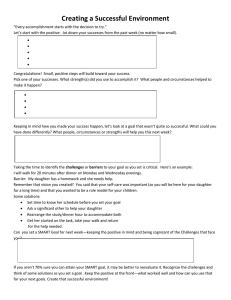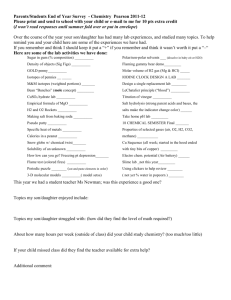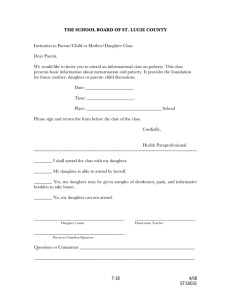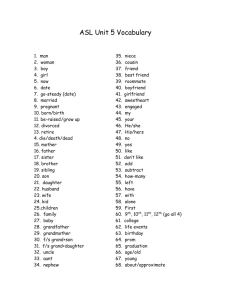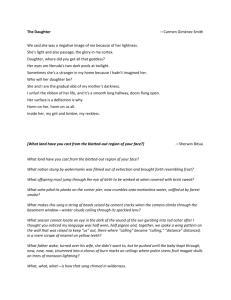>As˚ig ma>bad (The Passion of Ma>bad): The Epic Confronts Hilali History
advertisement
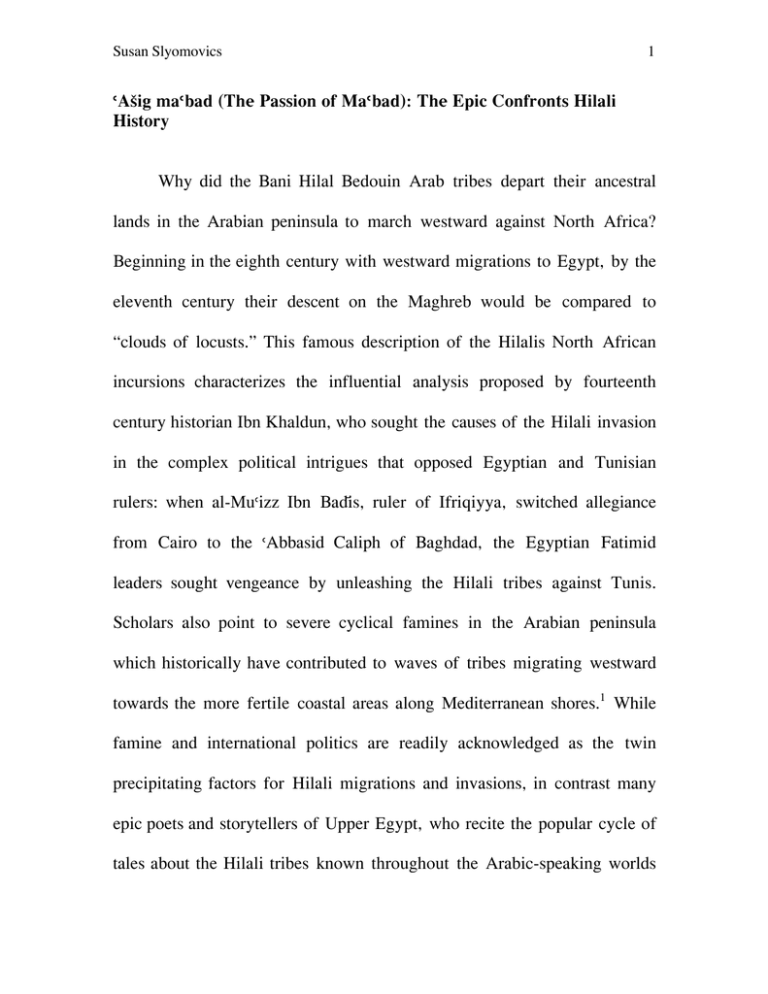
Susan Slyomovics 1 >As˚ig ma>bad (The Passion of Ma>bad): The Epic Confronts Hilali History Why did the Bani Hilal Bedouin Arab tribes depart their ancestral lands in the Arabian peninsula to march westward against North Africa? Beginning in the eighth century with westward migrations to Egypt, by the eleventh century their descent on the Maghreb would be compared to “clouds of locusts.” This famous description of the Hilalis North African incursions characterizes the influential analysis proposed by fourteenth century historian Ibn Khaldun, who sought the causes of the Hilali invasion in the complex political intrigues that opposed Egyptian and Tunisian rulers: when al-Mu>izz Ibn Badiµs, ruler of Ifriqiyya, switched allegiance from Cairo to the >Abbasid Caliph of Baghdad, the Egyptian Fatimid leaders sought vengeance by unleashing the Hilali tribes against Tunis. Scholars also point to severe cyclical famines in the Arabian peninsula which historically have contributed to waves of tribes migrating westward towards the more fertile coastal areas along Mediterranean shores.1 While famine and international politics are readily acknowledged as the twin precipitating factors for Hilali migrations and invasions, in contrast many epic poets and storytellers of Upper Egypt, who recite the popular cycle of tales about the Hilali tribes known throughout the Arabic-speaking worlds Susan Slyomovics 2 as Siµrat Baniµ Hilaµl, present an alternate literary history and reading from traditional chroniclers such as Ibn Khaldun. According to the performed version by the Upper Egyptian epic poet >Awadallah >Abd al-Jalil >Ali, it is a father-daughter tale of incest that frames, indeed instigates, the occasion of the Hilali invasion of North Africa. The incest theme is enshrined in the opening sequence of Part II of the customary tripartite division of Siµrat Baniµ Hilaµl entitled the riyada or “reconnaissance,” even as it is enunciated in the opening tale’s subtitle as given by the poet >Awadallah: “The Passion of Ma>bad for His Daughter” (>as˚ig ma>bad ma> bintuh). >Awad\allah >Abd al-Jaliµl >Ali is an epic poet from the province of Aswan in Upper Egypt. He sings in the surrounding southern Egyptian marketplaces, in cafes, during public ceremonies, and at people's homes to celebrate births, weddings, circumcisions, a return from the hajj to Mecca, and Ramadan break fasts. I have described elsewhere the complex status of the epic poet in southern Egypt as well as my research project to record versions of the epic by professional reciters.2 >Awadallah begins his “elicited” performance, recorded 13 March 1983 in Luxor, Egypt,3 first with the title, then with a brief praise-poem or madiµh\ (lines 1-2): Susan Slyomovics 3 1. yaµ >eµniµ -is\s\abr awlaµli4 Patience is foremost [first] 2. -is\\s\abr awla min ilgalagaµn Patience is more important than worry The tale continues as he recounts how the ruler of Tunis, Sultan Ma>bad, chances to ascend the upper levels of his vast palace there to encounter, presumably for the first time, his grown-up and now beautiful daughter, >Aziµza. Overcome at the sight of her, Ma>bad falls to the ground in a swoon causing his daughter to gather him up in her arms (lines 3-33): 3. ma>bad jaµlis >ala –lkaraµsi Ma>bad is seated on his throne, 4. ?abu >aziµza rajil sult\aµn father of >Aziµza, a sultan. 5. tis˚uµru jamiµ> il>arab All the Arabs seek his counsel, 6. tis˚uµru jamiµ> ilfirsaµn All the horsemen, seek him. 7. illa fiµ yoµm min illayaµli Then one day among the nights, Susan Slyomovics 8. tammit-lu -s˚huµr wa-zaman months and destiny came to pass, 9. lam t\il>as˚ ilgas\r il>ali he never ascended the lofty palace 10. >and miraµtu foµg abu >imdaµn to his wife atop the many-pillared castle, 11. t\ili> il-gas\r il>ali he ascended the lofty palace, 12. wa-yis˚arraf foµg il-binyaµn and looks down from atop the building. 13. huwwa wi-t\aµli> >a –ssalaµliµm While ascending the stairs, 14. yibus\s\ bi ->eµnu bi –l>ayaµn he glances with his eyes, 15. yunzur essafiµra >aziµza he looks on the elegant >Aziµza 16. lakinni xaµrja min ilh\ammaµm as she was leaving the baths, 17. t\alga –lmisk I ma> -t\t\iµb wafting musk with perfume, 4 Susan Slyomovics 18. wa min s˚ammu –l>aliµl yit\iµb from her scent, the sick are cured, 19. izaµ kaµn raµgid >al moµt darkaµn if one lay near death, a last breath, 20. jara –lmirwaµd fi –l>eµn when she lines the kohl stick along her eye 21. wa –tfat\ir s\aµyim ramad\an she makes those who fast, break Ramadan 22. labsa toµb s˚imini wa –rxini wearing a robe, scented and diaphanous, >Awadallah: ins˚abak he is ensnared 23. h\alig wisnig min giddaµm watch how her breasts break loose in front. 24. s˚uµf ilbint I xaµyil >aµdalha aµh5 See the maiden, beautifying her form, ah, 25. min foµg >ali –s\s\araµya from atop the high palace, 26. koh\|l il>eµn ma>na >aµda liµha kohl-darkened eyes as was her custom, 5 Susan Slyomovics 6 27. galiµl was\fiha fi –s\s\abaµya few of her description among the maidens. 28. yaµ maµ jamiµla O how beautiful she was, 29. mabrumt issaµg rounded, firm legs, 30. yaµ >eµni mabrumt issaµg O her rounded, firm legs, 31. u miµn fiµ -s\s\abaµya jamiµlha and who among the maidens has her beauty, 32. tiguµl t\iµn jaziµra lamma saµg you would say a silted island when the water rises 33. ilbint I xaµyil jammaµlha / jamiµlha6 the girl, imagine her beauty. As >Aziµza tends her fainting father, father and daughter meet in a seemingly innocent physical embrace (lines 34-46) and >Aziµza presciently inquires if her father’s fainting spell means he has lost his reason. 34. u ma>bad wa>Iµ -l>aziµza Susan Slyomovics Ma>bad gazed on >Aziµza, 35. >aglu -ssaliµm andaµr his sound reason became twisted, 36. t\aµh\ >a -lgasr il>ali astray above the high castle, 37. waga> beµn ijjirdaµn he fell down the staircase. 38. >aziµza tlimm abuµha >Aziµza gathered up her father 39. beµn innihuµd ma> -rrumaµn between her breasts, they are like pomegranates. 40. s˚amm ilmisk ma> -t\t\iµb He smelled musk and scent, 41. karaf irriµha -ssult\aµn the sultan smelled perfume from afar. 42. galit ya abuµya ?ismallah >aleµk She said, “O my father, God protect you, 43. ?ismallah >aleµk ya sultaµn God protect you, O sultan, 44. ya –buya eµh illi jaraµlak 7 Susan Slyomovics 8 O my father, what happened to you? 45. >aglak issaliµm mindaµr Your sound reason is turned around?” Succoured between her perfumed breasts, Ma>bad falls in love with his own daughter using phrases well known to amorous Upper Egyptian partners (lines 46-54): “when are lovers to be blamed.”7 Love conquers all, according to the sultan, even permitting him the authority to marry, rather than marry off, his own daughter: 46. gaµl ya >aziµza xallini fi h\aµli He said, “O >Aziµza, let me be, 47. mettaµ >a-l>as˚agiµn malaµm when are lovers to be blamed, 48. ya bit ana >as˚igtak O daughter, I desire you, 49. ilh\\ubb bud>a lam >azar insaµn love is a marvel, a person cannot be blamed. 50. ya >aziµza ?ana >as˚igtak O >Aziµza I desire you, Susan Slyomovics 9 51. u-galbi kteµr liki maµl and my heart yearns for you. 52. ya biti ana kaµtib li-wah\di O my daughter, I will draw up a marriage contract myself, 53. ?aktab >aleµki I will draw up one with you, 54. w-ajri >aleµki li-sunna h\alaµl and proceed with you according to lawful custom.” Comparing ownership of his daughter ‘s body to his stewardship over the land, he demands his rightful sexual rights equating them to agricultural bounty. “Who is like your father?” he demands of his daughter, reversing the kin relation most socially taboo, to promote the closest member. Though the preferred marriage partner in Upper Egyptian society for a daughter is in the first cousin line, especially the father’s brother’s son, Mac>bad’s questions to his daughter are disconcertingly direct and sexual to an Upper Egyptian listener: “peaches” and “pomegranates” to be harvested are common similes for a women’s breasts, the ”orchard” to be “entered” stands for penetrating the female genitals and “to rule and trace the riverbeds” describe the interior fold of the vagina and sexual intercourse.8 Susan Slyomovics 55. ya bit miµn zayy abuµki “O daughter, who is like your father 56. yigni –lxuµx ma> -rrumaµn to harvest the peaches and the pomegranates? 57. ya >aziza u miµn zayy abuµki O >Aziµza who is like your father 58. yixus˚ ilbust\aµn to enter the orchard? 59. ya biti miµn keµf abuµki O my daughter, who is unto your father 60. yuh\kum wa-yirsim bi –lwadyaµn to rule and to trace in the riverbeds? 61. ya biti xuµdi abuµki O my daughter, marry your father 62. wi-ti>Iµs˚iµ fiµ hanaµ wa-<amaµn and you will live in joy and safety.” 10 Susan Slyomovics 11 >Aziµza protests marriage with her father and calls for supporting legal protections, the Muslim shar>ia that regulates and ordains lawful unions as interpreted by clerics: 63. ya –buya <ismallah >aleµk “O, my father, may God protect you, 64. yak >aglak is-saliµm andaµr truly your sound mind wanders. 65. miµn gablak axad bitu Who, before you, has married his daughter 66. fi s˚ar> nas\aµri wila >islaµm according to Christian law or in Islam? 67. ya –buya h\at il>ulamaµ O my father, bring the clerics, 68. ahl ilfad\l wi –lquraµn people of moral virtue and of the Koran. 69. <inn galuµlak xuµd >aziµza If they tell you, marry >Aziµza, 70. <aktib >alayy bi-sunna h\alaµl then write me a marriage contract according to lawful custom.” Susan Slyomovics 12 Ma>bad convenes his clerics and presents them with a series of questions. As Otto Rank observes in his study, Incest in Literature and Legend,9 it is noteworthy that cross-culturally an element of the fatherdaughter incest theme often includes riddles posed by the father to suitors. Ma>bad’s questions to the clerics are prefigured in the rhetorical series already asked to his daughter, ostensible riddles whose meanings are fully understood by >Aziµza. The father’s purpose, avers Otto Rank, is to set up impossible tasks by asking riddles thereby keeping rivals and suitable love objects from the daughter and permitting the father to possess his own daughter. Rank draws on numerous medieval European tales, ancient Greek, Babylonian and Persian legends, to compare the ways in which suitors must solve impossible riddles or, functionally another substitutable narrative element for a riddle, suitors must overcome dangerous obstacles set by the father before the daughter is awarded to the winner. In these cases, the daughter is an important love object but otherwise she is absent during the important exchanges between the father, her current owner, and a future owner-husband. In >Awadallah’s rendition, the Muslim clerics precede, perhaps stand in for potential suitors, because they represent the surrounding religious and social sanctions. Ma>bad’s riddles are equally transparent to them and even Susan Slyomovics 13 though they are in need of more food and clothing as the month long Ramadan approaches, not even material concerns can buy the clerics acquiescence to Ma>bad’s requested transgression: 71. ma>bad tawwir munaµdi Ma>bad sent around a crier 72. >ala ahl il-ulama fi kull I bakan to scholars every place. 73. firh\it ilulama jami>an The scholars all rejoiced, 74. ilmifattah\ gaµd il>amiyaµn the sighted lead the blind. 75. illi yiguµl raµh\ yiksiµna Some say he will clothe us, 76. >aleµna daxil >Iµd ramad\an for Ramadan is soon upon us, 77. w-illi yiguµl hayigata> ru<usna and others say he will cut off our heads 78. taji –lxsara >a –l>amyaµn he will come to cut off the blind. 79. itlammu juwwa –ddawawiµn Susan Slyomovics They gathered inside the diwans, 80. fiµ diwaµn ma>bad issult\aµn in the diwan of Ma>bad the sultan. 81. nadah\ wi-gaµl ya ulamaµ He called out and said, “O clerics, 82. >aleµkum wila <agati kalaµm to you I do not conceal my words: 83. >andiyya tamra fi –lbeµt, tamar I have a date tree at my home, 84. t\arah\it min giµr >awaµm it became ripe out of season, 85. yis\ah\h\ nakuµlha is it permissible to eat it 86. wila nizakiµha >a –laytaµm or give it as charity to orphans?” 87. rayiµs ilulamaµ yiguµllu The chief cleric said to him: 88. ilkaµn hiyya tamra If indeed it is a date tree,” 89. yigullu akl ittamra h\alaµl 14 Susan Slyomovics 15 he said to him, “ eating dates is permissible, 90. wi-za kaµn izzeµna >aziµza but if it is the beauteous >Aziµza 91. yibga h\araµm ya sultaµn it will be a crime, O sultan.” 92. Ma>bad sah\ab isseµf Ma>bad wielded his sword 93. >aleµhum walad ilyat\agan against them, he brough forth the javelin, 94. Ma>bad sah\ab isseµf Ma>bad wielded his sword. 95. t\il>uµ ramh\iµn bi –lmis˚waµr They emerged fleeing this commission, 96. il>ulama t\il>uµ ramh\iµn the clerics emerged fleeing, 97. ilmifattah\ s\ah\h\ il>amyaµn the sighted dragging the blind. Since Ma>bad, the sultan, cannot possess his own daughter according to law or her own consent, as her father and ruler of Tunis, he swears that he will Susan Slyomovics 16 prevent any other man from having her. Otto Rank notes that in the myths of Perseus, Gilgamesh and Romulus, the father secludes the daughter presumably to preserve her virginity. Frequently, the father’s persecution of his daughter arising from rejected love takes the symbolic form of her isolation in a tower:10 98. ma>bad xalaf bi yimiµn Ma>bad swore an oath: 99. ana min t\uµl h\ayy >a –ddunya As for me, during my entire life in this world, 100. >aziµza ma titjawwiz rijaµl >Aziµza will not marry men.” 101. ma>bad nadam il banayiµn Ma>bad summoned builders, 102. juµ-lu h\afyin min ard\ is˚s˚aµm they came to him, shoeless, from Syrian lands, 103. yindah >a –t\t\awabiµn he summoned brickmakers 104. >as˚ra ts˚ara> fi –lbinyaµn ten to lay out the building, Susan Slyomovics 17 105. ilmuhandisiµn s˚ayy katiµr engineers, so many of them, 106. s˚arah\ ilgas\r abuµ -l>umdaµn they laid out the many-pillared castle, 107. s˚arah\ gas\r >aziµza they laid out >Aziµza’s castle. 108. h\alaf wi-watag ilaymaµn He swore msking stronger his oaths: 109. min t\uµl h\ayy >ala –ddunya “For my entire life on this earth 110. >aziµza ma dugg rijaµl >Aziµza will not taste a man.” Aziza is immured in her castle with a maidservant, Mayy, who will serve as the link between Tunis and Arabia. It happens that Mayy is a Hilali Bedouin who appears in the slavemarkets of Tunis. She has been purchased by the sultan to care for >Aziµza, and she whiles away time amusing the miserable and bored >Aziµza by recounting tales of her Arabian home and its mighty warriors. Through narrative and storytelling, >Aziµza falls in love with Yuµnis, the hero Abu Zayd’s nephew. The two women contrive to send messages back to the Hilalis in Arabia to inform them that Tunis is weak Susan Slyomovics 18 and easily invaded. The daughter’s revenge against the father is powerful, personal, and political. Ma>bad the sultan will lose possession of his daughter just as he will be toppled as ruler. In both instances, his nemesis are the Hilali Bedouins. What does this performed tale mean to the audience, to the storyteller, and to the folklorist collector? During the performance, S\a>Iµd\iµ listeners clucked their tongues disapprovingly as the narrative unfolded. During discussions after the performance, most listeners denied that any instance of father-daughter incest had ever occurred in >Awadallah’s village of Najis al-Haj>. In our private conversations, >Awadallah remembered specific village examples and recounted one flagrant case of a daughter impregnated by her father whose child was adopted by her family as her sister at the same time as the sinning father was banished from the village. While these contested and often repressed village histories may or may not support actual cases of known incest in Upper Egypt, what is emphasized in my analysis is the fantasy and the fantastic dimensions of folklore in general, and of popular transmitted folk epic in particular. According to Otto Rank, the fantasy creations and substitutes emerging from the father-daughter incest complex are always presented from the father’s perspective, not the daughter’s. Rank larger claims are that Susan Slyomovics 19 “artistic activity is intended to gratify and justify male sexual fantasies.”11 Comparing father-daughter incest with psychiatry’s assertion of the more serious infraction of mother-son incest, Rank notes a diminished degree in kinship between father and daughter and no serious age difference to impede the realization by males (e.g. fathers) of their violent and satisfying expression of fantasies. The father-daughter incest theme in this Upper Egyptian epic shares elements that correspond to many of Rank’s characterizations, but at one extreme. The incest is conscious and must be consciously foiled. Therefore it cannot be contained within the family context, instead this instance of father-daughter incest is resolved within vast social and political frameworks: extreme political upheaval will ensue completely reorganizing for centuries to come the geography, boundaries, even the ethnic and religious composition of North Africa. An historical catastrophe for a region, in Ibn Khalduµn’s words meriting a description of “locusts descending,” can only have as its motivating source, according to Upper Egyptian epic singers, the wrath, incest fear, and ultimately, the realized passion of a woman who cannot be thwarted. Susan Slyomovics 1 20 For viewpoints on the geographical and political causes of Hilali movements westward, see Ibn Khalduµn, Kitab al->ibaµr wa diµwaµn almubtada< wa-al-khabar, trans. W. MacGuckin de Slane, Histoire des Berbères et des dynasties musulmanes de l’Afrique septentrionale (Paris: Paul Geuthner, 1925-26); H. R. Idris, Hilal,” Encyclopedia of Islam, IX?, p.; and Jacques Berque, “De nouveau sur les Banu Hilal?” in Studia Islamica 36 (1972), pp. 99-111. 2 See my The Merchant of Art: An Egyptian Hilali Oral Epic Poet in Performance, Berkeley: University of California Press, 1988; "Methodes de transcription et traduction d'une performance de geste orale arabe," in Le Conte, ed. Pierre Lyon and Paul Perron Montreal: Didier, 1987), pp. 127139; "The Death-song of Amir Khafaji: Puns in an Oral and Printed Episode of Sirat Bani Hilal," Journal of Arabic Literature, 18 (1987), pp. 62-78; "Arabic Folk Literature and Political Expression," Arab Studies Quarterly, 8:2 (Spring 1986), pp. 178-185; and "Praise of God, Praise of Self, Praise of the Islamic People: Arab Epic Narrative in Performance," Classical and Popular Medieval Arabic Literature: A Marriage of Convenience? Festschrift in Honour of H. T. Norris," ed. Farida AbuHaidar and Jareer Abu Haidar, London: Curzon Press, in press. 3 The text of >Awad\allah's story is based on my unpublished fieldwork tapes recorded in 1983 in Upper Egypt. A complete set of >Awad\allah's version of Siµrat Baniµ Hilaµl is available in the Folk Arts Center, Tawfiqiyya, Cairo, Egypt. 4 Transliteration protocols for S\a>iµd\iµ Arabic follow Slyomovics, The Merchant of Art, pp. 269-273: Appendix A: Notes on Translation and Transliteration. 5 See The Merchant of Art, line 237, p. 114 for >Awad\allah’s multiple puns of the phrase. 6 Ibid., line 1036, p. 221 for >Awad\allah’s multiple puns of the phrase. 7 >Awad\allah employs variants to the phrase, “when are lovers to be blamed,” in his rendition of a tale from A 1001 Nights, where the theme of a royal father who locks up his daughter because she falls in love with a prince is repeated. See my “Performing 1001 Nights in Egypt,” Oral Tradition 9:2 (1993), pp. 390-419. Susan Slyomovics 8 21 Ibid., pp. 398-399 where >Awad\allah compares metaphorically the folds of a woman’s genitals to delicate bird tracks. 9 Otto Rank, The Incest Theme in Literature and Legend: Fundamentals of a Psychology of Literary Creation, Baltimore: Johns Hopkins University Press, 1991, especially pp. 300-337 on father-daughter incest. 10 Ibid., pp. 313-314. 11 Ibid., p. 301.

